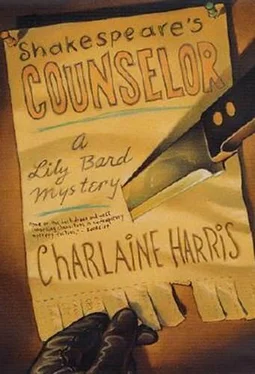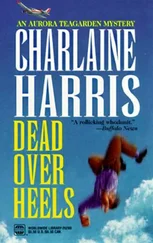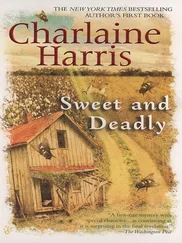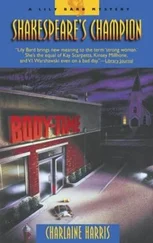The other women were OK. I’d gradually learned their personal histories. In a town the size of Shakespeare, keeping identities a secret was impossible. For example, not only did I know that Carla (of the croaking voice) was Carla Preston, I knew that her dad had retired from Shakespeare Drilling and Exploration, and her mom took the lunch money at the elementary school cafeteria. I knew Carla smoked like a chimney when she went out the back door of the Health Center, she’d been married three times, and she said everything she thought. She’d become a grandmother when she was thirty-five.
Melanie Kleinhoff no longer looked quite as sullen, and despite her youth and pale doughy looks, she set herself goals and met them (no matter how difficult) to the point of idiocy. She had never graduated from high school and she was still married to the man whose brother had raped her. Firella Bale, probably the most educated of all of us-with the exception of our counselor-seemed baffled sometimes by how to fit in; she was black, she was smart and deliberate, she had taught others, and she worked in a position of authority. She was a single mother and her son was in the army.
Sandy, Janet, and I had never doubted that we could share our problems with a woman of another race. Tamsin seemed a little more careful of Carla and Melanie. We would all have known right away if Carla was uncomfortable with Firella, since Carla had few thoughts she didn’t set right out in front of us. Luckily, she seemed to have passed that particular rock in the road. Melanie hadn’t, and we could watch her prejudice struggle with her good sense and her own kindness. Our common fate transcended our color or economic status or education, but that was easier for some of us to acknowledge than others.
I had neither witnessed any more incidents nor heard any rumors about Tamsin and her husband. I had not spoken a word about what Jack and I had seen that evening while we were out walking. As far as I could tell, no one in Shakespeare knew that someone was stalking our counselor.
Sandy McCorkindale was waiting outside when I arrived for our third evening together. While I knew more about Sandy’s life than I knew about almost any of the others-I’d met her husband, seen her sons, worked in her church, walked by her home-I realized I understood her less than any member of our little group. Waiting in the heat with her was not a happy prospect.
In the two weeks since our first meeting, the season had ripened to full-blown summer. It was hotter than the six shades of hell standing on the asphalt, maybe the temperature was down to ninety-four from the hundred and four it had been that afternoon. At eight o’clock, the parking lot wasn’t dark; there was still a glow from the nearly vanished sun. The bugs had started their intense nightly serenade. If I drove out of town right now and parked by the road in an isolated place and tried to talk to a companion, the volume of bug and frog noise would put a serious crimp in the conversation. Anyone expecting nature to be silent-especially in the South-was plain old nuts.
I got out of my car reluctantly. It had been a fruitless day on stakeout in Little Rock, and Jack was out of town on a missing-persons job, so I wasn’t having the mild glow of accomplishment I usually enjoyed after a long day. When I went home after the therapy hour, I promised myself, I would take a cool shower and I would read. After a day spent dealing with others, television was just one more batch of voices to listen to; I’d rather have a book in my hands than the remote control.
“Evening, Sandy,” I called. At that moment, the pole-mounted security lights came on. With the residual daylight creating long shadows from behind the trees, I was walking across a visual chessboard to reach the woman standing by the side door we always used. As I drew closer, I could see the preacher’s wife had sweat beaded on her forehead. She was wearing the current young matron uniform, a white T-shirt under a long sleeveless, shapeless khaki dress. Sandy’s streaked hair was still in its slightly teased-with-bangs Junior League coiffure, and her makeup was all in place, but there was definitely something happening in her head. Her brown eyes, dark and discreetly made up, darted from my face to the cars to the bushes and back.
“Tamsin didn’t leave the door open,” Sandy said furiously. She was carrying her straw shoulder bag in the usual way, but with an abrupt gesture she let the strap slide down her arm and she swung the bag, hard, against the side of her car. That made me jump, and I had to repress a snarl.
I wondered, for maybe the fifth or sixth time, why Sandy kept coming. She’d never talked in any more detail, or with any more feeling, about what had happened to her, but she kept showing up. She was making a real effort to keep herself separated from the common emotional ground. But every Tuesday night, there she was in her chair, listening.
I leaned against the wall to wait for Tamsin to unlock the door. I didn’t feel up to any more emotional outbursts from Sandy McCorkindale.
Melanie and Carla arrived together. I had decided they’d known each other before coming to the therapy group. In conversation, I’d heard them refer to common acquaintances.
“Good! I got time for a cigarette,” Carla said in her harsh voice. She had one lit and puffing in a flash. “My car done broke down today in front of Piggly Wiggly, and I had to call Melanie here to give me a ride.”
Normally I would have expected Sandy to pick up the conversational ball, but not tonight.
“What’s wrong with the car?” I asked, after a beat.
“My boyfriend says it might be the alternator,” Carla said. “I sure hope it’s something cheaper. Tamsin not here yet?”
“Her car is over there,” Sandy said resentfully, pointing to Tamsin’s modest Honda Civic. “But she won’t open the door!”
Melanie and Carla gave Sandy the same kind of careful sideways look I’d found myself delivering.
Firella came walking from the darkness at the other end of the small parking lot, pepper spray in one hand and keys in the other.
“Hey, y’all!” she called. “We meeting out here in the parking lot tonight?” Carla laughed, and Melanie smiled. As Firella drew closer, she counted us and observed, “One of us hasn’t made it here yet.”
“Oh, Janet’s car’s here, too,” Sandy snapped. “See?”
We all looked over to note that Janet’s dark Camaro was half concealed by Tamsin’s Honda.
“So where’s Janet, and why won’t the back door open? You think Tamsin and Janet are in there doin‘ it?” asked Carla. She didn’t sound angry about the possibility-only ready for them to finish and unlock the back door, so she could get in the air conditioning.
Sandy was almost shocked out of her odd mood. “Oh, my gosh,” she said, rattled to the core. “I just never believed I could know anyone that… oh, my Lord.”
Though I was pretty sure Carla had just been blabbing- for the pleasure of hearing her own voice, and to shock Sandy-I didn’t comment. I got a phone book from the front seat of my car, pulled my cell phone from the pocket of the drawstring sheeting pants I was wearing because they were cool, and dialed the health center number.
Inside the building, we could hear the phone ring, very faintly. That would be the one at the main reception desk, inside the front door.
A voice came on the line. “You have reached the Hartsfield County Health Unit. Our office hours are nine to five, Monday through Friday. If you know the extension of the person you’re calling, please press it now.” I did.
From inside the building, we heard another phone begin to ring, this time closer. We counted the rings. After four, the female voice came back on the line, to tell me that the party I wanted to contact was away from her desk and to ask me to call back during office hours. She also told me what to do in case of emergency.
Читать дальше












